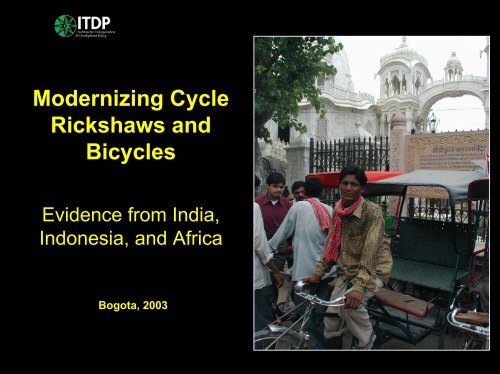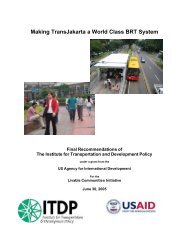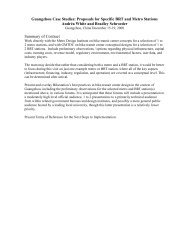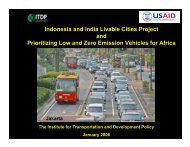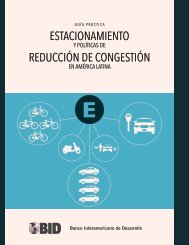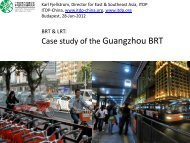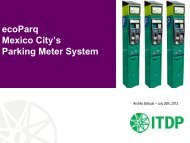Modernizing Cycle Rickshaws and Bicycles
Modernizing Cycle Rickshaws and Bicycles
Modernizing Cycle Rickshaws and Bicycles
You also want an ePaper? Increase the reach of your titles
YUMPU automatically turns print PDFs into web optimized ePapers that Google loves.
<strong>Modernizing</strong> <strong>Cycle</strong><br />
<strong>Rickshaws</strong> <strong>and</strong><br />
<strong>Bicycles</strong><br />
Evidence from India,<br />
Indonesia, <strong>and</strong> Africa<br />
Bogota, 2003
Traditional <strong>Rickshaws</strong> are Losing<br />
Passengers in India Because…<br />
• Not very comfortable with no sun protection<br />
• Very heavy, <strong>and</strong> the passenger feels guilty<br />
• Associated with backwardness<br />
• Dangerous roads<br />
• Hostile traffic police
Why Should We Care?<br />
• Reduces traffic congestion<br />
<strong>and</strong> air pollution<br />
• Increases the incomes of the<br />
poor<br />
• Improves basic mobility <strong>and</strong><br />
safety for women <strong>and</strong> children<br />
• Improves the health <strong>and</strong><br />
reduce the drudgery of cycle<br />
rickshaw operators.
Why Government Authorities Are<br />
Sometimes Hostile to <strong>Cycle</strong> <strong>Rickshaws</strong><br />
• Control rural-urban<br />
migration<br />
• Image of Backwardness<br />
• Motorists complain<br />
they block the road<br />
• Taxis <strong>and</strong> motorcycle<br />
rickshaws are more<br />
powerful politically.<br />
• Associated with crime,<br />
riots, or social<br />
movements.<br />
<strong>Rickshaws</strong> Being Confiscated in Delhi
Why Governments Support <strong>Modernizing</strong><br />
Human Powered Vehicles<br />
• To help the poor people<br />
• To impose new regulations in certain areas<br />
• To improve the image of cycle rickshaws<br />
• To quiet, pollution-free<br />
travel in tourist areas
Why Even Environmentalists <strong>and</strong> NGOs<br />
Support Some Regulation of these Vehicles<br />
• Increases wages<br />
• Reduces the threat of crime<br />
• Reduces the danger of accidents at night<br />
<strong>Cycle</strong> Rickshaw unions<br />
should be encouraged<br />
<strong>and</strong> supported in order to<br />
protect the drivers <strong>and</strong><br />
create self-regulation<br />
Becak Union
Why the private sector doesn’t innovate on<br />
their own<br />
• Profit margin is too low<br />
• Producers are risk-averse small businesses<br />
• Consumers are risk-averse low income people<br />
Underwriting the risks of new<br />
product development,<br />
marketing, <strong>and</strong> dissemination<br />
can overcome these barriers<br />
to modernization.
US <strong>and</strong> Indian Engineers Worked Together
10 Prototypes were developed<br />
20 of each were sold or<br />
leased to <strong>Cycle</strong><br />
Rickshaw Wallahs
The largest manufacturer<br />
<strong>and</strong> a new competitor were<br />
involved in the design <strong>and</strong><br />
marketing from the<br />
beginning<br />
Sunil Kumar, Hari Om<br />
G. Shyam, Designer, (left) w/<br />
Mr. Gupta <strong>and</strong> Gupta of Shiv<br />
Shakti Udyog Ltd.
The Final Design (more or less)<br />
Production Cost:<br />
Same as<br />
traditional<br />
rickshaw<br />
•30 kilograms lighter weight<br />
•Wide, comfortable woven nylon seat<br />
•Permanent canopy for sun <strong>and</strong> rain protection<br />
•Integral (one-piece) frame two speed gear system
The First Trial Fleet<br />
Was Sold to the<br />
Wallahs at the<br />
Sheraton near the<br />
Taj Mahal.<br />
A marketing firm was<br />
hired to sell the vehicles.<br />
There were bonuses for<br />
each sale.
The Wallahs at the East <strong>and</strong> West Gates of<br />
the Taj Mahal were the second sale
Press Conferences <strong>and</strong> Events with Mayors<br />
<strong>and</strong> Other Government Leaders Boosted<br />
Sales <strong>and</strong> Investor Confidence
Selling the traditional financiers <strong>and</strong><br />
fleet owners in the city of Vrindavan<br />
led to the rapid replacement of the<br />
entire fleet (1000 vehicles).
With big orders, the<br />
new market entrant,<br />
Shiv Shatki Udyog<br />
invested in ‘mass<br />
production.’ The<br />
project team built<br />
the necessary jigs.<br />
This forced Hari Om, the traditional manufacturer,<br />
to switch as well.
Why Did the Financiers (Maleks) Switch?<br />
• The operators got more<br />
passengers because the<br />
vehicles were more<br />
comfortable.<br />
• The maleks were able to<br />
charge higher rent.<br />
• The vehicles cost only<br />
marginally more.<br />
• Hence, the new vehicles<br />
were more profitable.<br />
NOBODY (EXCEPT THE PRESS) CARED ABOUT THE HUMANITARIAN REASONS!
By the end of the project,<br />
there were three<br />
fully commercial<br />
assemblers<br />
<strong>and</strong> 2 frame<br />
manufacturers.<br />
Two were the traditional<br />
manufacturers.
The Agra Frame manufacturer<br />
opened in Delhi, <strong>and</strong> began selling<br />
400 modern vehicles a month.<br />
This forced the<br />
Maleks in Delhi<br />
to switch.
Today…<br />
• Over 18,000 modern cycle rickshaws are<br />
operating on Indian Streets<br />
• They operate in 9 Indian cities<br />
• There are over 20 maleks in Delhi <strong>and</strong><br />
another 10 assemblers <strong>and</strong> manufacturers of<br />
the modern rickshaws around India.<br />
•None of the gear systems were commercially<br />
accepted.<br />
•Certain elements of the traditional vehicle were<br />
reintroduced, increasing the weight, so total<br />
weight reduction was only about 10kg-15kg.
Impact of the Project on the Poor<br />
• The operators (most of them are poor) earn on average<br />
50% more income<br />
• They pay 5% - 10% of this to the owner in higher rental<br />
fees<br />
• They make more per ride<br />
• They carry more passengers per ride<br />
• They get more rides<br />
• They operate in areas where no cycle rickshaws<br />
previously operated<br />
• The 10% - 25% weight reduction reduces the<br />
calories the operator burns per day <strong>and</strong> hence<br />
the food they need to survive.<br />
• They are much more comfortable for sleeping!
How Modern <strong>Cycle</strong> Rickshaw Passengers<br />
Would Otherwise Have Made their Trip<br />
TRAD. RICKSHAW<br />
WALK/BICY<br />
CLE<br />
19%<br />
PRIVATE<br />
SCOOTER<br />
2%<br />
TANGA<br />
15%<br />
VIKRAM<br />
19%<br />
TRAD.<br />
RICKSHAW<br />
28%<br />
BUS<br />
11%<br />
AUTO<br />
RICKSHAW<br />
6%<br />
BUS<br />
AUTO RICKSHAW<br />
VIKRAM<br />
PRIVATE<br />
SCOOTER<br />
WALK/BICYCLE<br />
TANGA
Project Replication in<br />
Indonesia:<br />
Gadjah Mada University,<br />
Yogyakarta
Trial Fleet of 20 Vehicles Went Into<br />
Operation December 2002<br />
One Development Bank has<br />
ordered 400 to sell on credit
• Final Prototype is half the weight (50kg) of the traditional becak (100kg)<br />
• All have Shimano 7 speed rear derailleur.<br />
• The production cost is 20% higher but will be brought to parity.<br />
• The h<strong>and</strong>ling is much better.<br />
• It has much better visibility at night.<br />
• The vehicle is somewhat more comfortable.
<strong>Modernizing</strong> the Normal Bicycle in Africa<br />
Trek’s California Bike is the first effort by a Global<br />
bicycle industry leader to find a market in Africa.
Obstacles to Better Bikes in Africa<br />
• Most bike dealers are too<br />
small to import full<br />
container loads direct from<br />
China or India.<br />
• Profit margins are too low<br />
to invest in marketing.<br />
• <strong>Bicycles</strong> are not designed<br />
for African utilitarian use.<br />
• Some countries have<br />
higher tariff barriers than<br />
on cars.<br />
• All bikes <strong>and</strong> parts are<br />
imported<br />
Accra <strong>Cycle</strong> Market
ITDP Solutions:<br />
The Global Bicycle Fund<br />
• Forging buyers collectives to reach<br />
returns to scale<br />
• Working directly with international bike<br />
companies<br />
• Providing credit <strong>and</strong><br />
technical assistance to the<br />
African Bicycle Industry
Bicycle Caravan, Accra, Ghana,<br />
January 2003<br />
ITDP Solutions:<br />
Working with<br />
Local Government<br />
<strong>and</strong><br />
the Bicycle Industry<br />
to Promote<br />
Utilitarian Cycling


